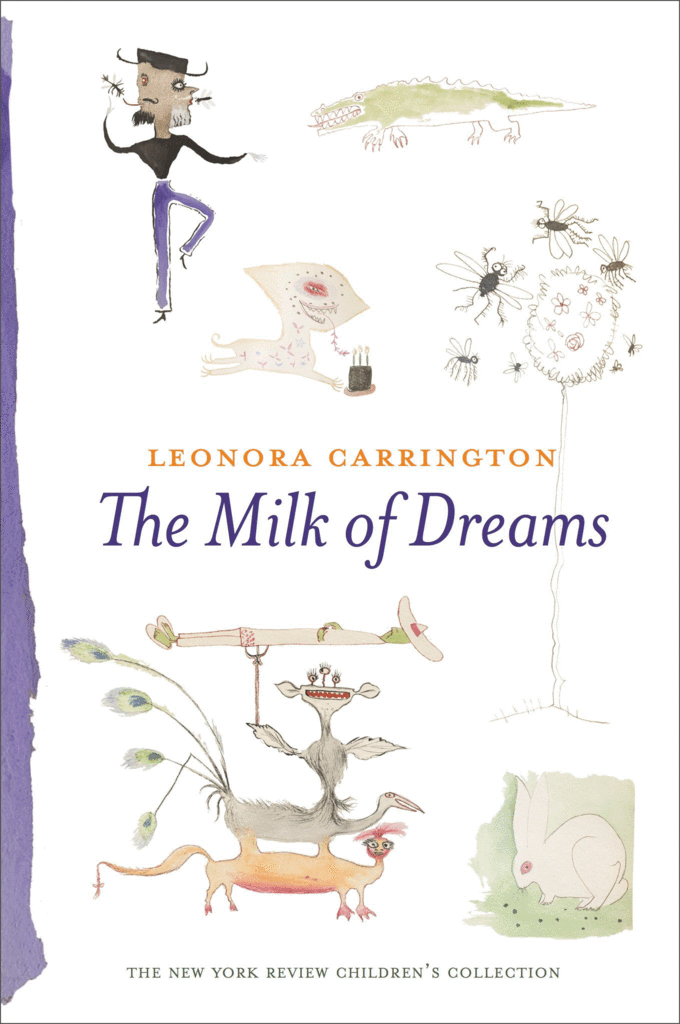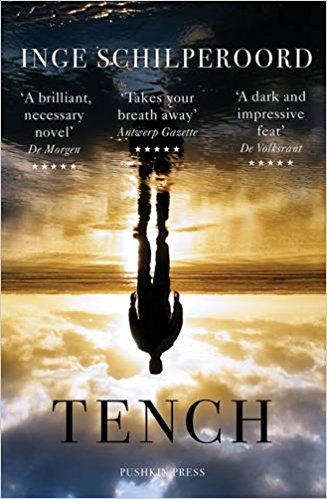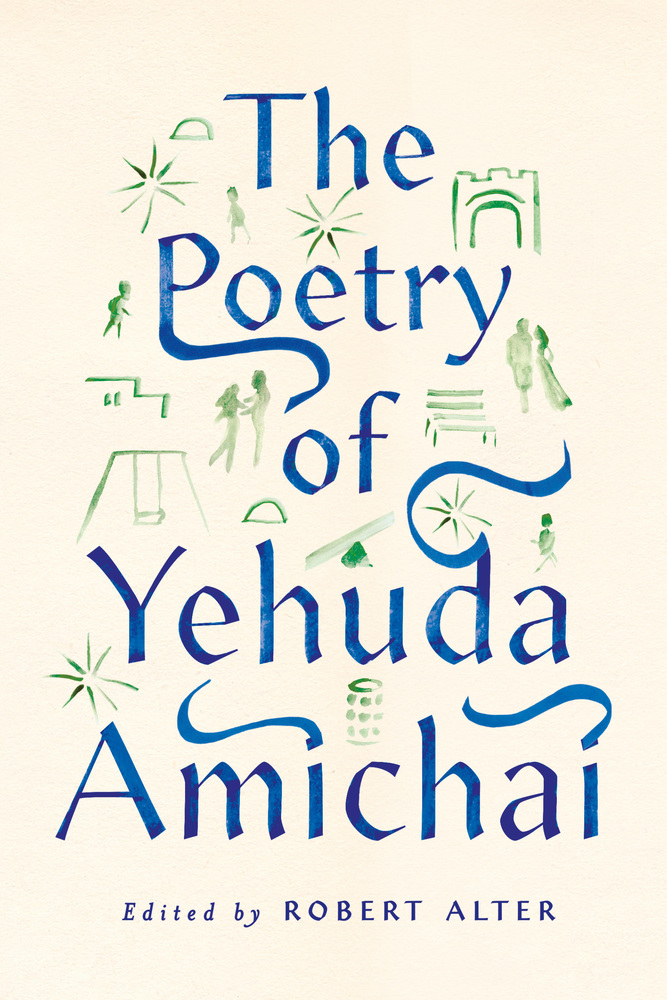
The Milk of Dreams, by Leonora Carrington, tr. by the author, New York Review Books
Reviewed by Beau Lowenstein, Editor-at-Large for Australia
Leonora Carrington grew up listening to folktales told by her Irish nanny in Crookhey Hall. She spent most of her life in Mexico City and became renowned as a Surrealist painter, artist and novelist. Her children recount how they used to sit in a large room on whose walls their mother’s fantastical stories were brought to life. There were deranged creatures and wild forests, and mystical persons standing amid steep, clouded mountains. Carrington’s breath as a storyteller was as broad as her genius for painting and imagery, and the paring of the two resulted in a small notebook she called The Milk of Dreams (New York Review Books, 2017) – perhaps the only surviving relic of that enchanting time where, each day for her children, she opened the door to a realm of fantasy and wonder.
We are introduced to Headless John on the first page, which immediately sets the tone:
The boy had wings instead of ears.
He looked strange.
“Look at my ears,” he said.
The people were afraid.
Her stories, which are often not much more than a few lines in length, give a sense of whimsical creativity; the kind that is not just rare in literature but exceedingly so in children’s stories. Meet George, who enjoys eating walls and eventually grows his head into a house; Don Crecencio the butcher and his goat’s meat roses; and the monster Chavela Ortiz, who has six legs, a golden jewel, pearls, and a portrait of Don Angel Vidrio Gonzalez, the head of the Sanitary Department. There is a freedom in Carrington’s tales that is both outrageous and unpredictable, and yet underlying is the realness of raw experience. These are not watered-down shadows of a story like so much of fantasy writing seen today – they delve into genuine emotions, which are often dark and complex.
And yet Carrington imbeds a wicked humour in her stories, too. In “The Horrible Story of the Little Meats,” an old and ugly woman is nicknamed Lolita by her friends and captures three children, imprisoning them and cutting off their heads. They are saved by a Green Indian who, in his ignorance, reattaches their heads to their hands and feet and buttocks, though, “the children were happy in spite of having their heads stuck on such funny places.”
A peculiar sense of narrative unfolds simultaneously through her illustrations. This separate dialogue weaves in and out through the words, sometimes harmoniously, often going off on a different tangent altogether, but always enlivening the imagination. They are bright and vivid and grotesque in the best way, and add another layer of complexity to an already surreal literary experience. Carrington translated much of the work herself (with small additions from her son Gabriel Weisz), and the stories feel alive with her curious sense of exploration in every corner.
If there is an unspoken rule for writing a book of children’s stories, Carrington probably breaks it. Her stories pay little dues towards rationality and any sense of a moral lesson is hidden beneath many layers. This is both liberating and gratifying, and shows a deep respect for the process of learning through imagination and storytelling. The Milk of Dreams is neither a book for children nor a manifesto for adulthood, but simply a beautiful collection of stories and illustrations that should be read by everyone.

Tench by Inge Schilperoord, tr. David Colmer, Pushkin Press
Reviewed by Tiffany Tsao, Editor-at-Large for Indonesia
Jonathan, the protagonist of Tench, is guilty of a terrible crime. Acquitted due to lack of evidence, but informed by the prison psychologist that he fits the profile of a repeat offender, he attempts to pick up where he left off: living alone with his mother, gutting fish at his factory job, avoiding human company, and taking long solitary walks with his dog. The bare facts about Jonathan suggest we’re in for a chilling tale. And yet, Tench is exactly the opposite. It is heartbreakingly, unbearably warm.
The heat wave afflicting the novel’s characters mirrors the unbearable conditions under which Jonathan must keep his cool, for dispassion and distance are the only things that can save him from undoing all his efforts at self-reform, from committing the same horrible deed again, or worse. But how can he not feel for Elke, the young girl next door who so doggedly seeks out his friendship—who seems to like his company and cares for animals as much as he does, who is so lonely and neglected and sad. It becomes clear early on in the novel that the eponymous tench, or “doctor fish,” that Jonathan is doing his best to nurse back to health, symbolizes his own self—a creature who can’t withstand heat, who is dangerously close to giving in. But he’s trying desperately not to. And we in turn can’t help but hope desperately along with him that he’ll beat the odds.
Contributing to the warmth saturating this novel is its form: the third-person confines us to Jonathan’s head, a tight squeeze that inspires a stifling empathy. When he tells himself determinedly, “If I do everything better than I have ever done before […] maybe I’ll make it all up,” we too feel a certain buoyancy and optimism, even as the words drive home how much of an uphill battle he is facing. And just as he finds himself drawn to Elke, we find ourselves drawn to him, and into him, to the point where, when we learn at last what Jonathan has done and fears he will do again, we too feel the emotions and impulses from which these actions spring.
Which brings us to perhaps the most powerful, disturbing thing about Schilperoord’s novel: its blurring of the distinction between admirable emotions—affection, tenderness, pity, admiration—and those we consider base. Just as the novel collapses Jonathan (and at one point, Elke) into the tench with a pressure verging on violence, so does the novel collapse the opposition between human warmth and what is commonly perceived as cold-blooded cruelty.
To paint this compelling portrait of criminality, Inge Schilperoord has drawn on her experiences as a forensic psychologist. And for its seamless translation into English from Dutch, we owe a debt to the prize-winning Australian translator David Colmer. In a 2012 interview, Colmer commented on the oft-drawn comparison between literary translation and “a performing art like music, with a translator as the performer and the original language as the score […] Getting the notes right is just the start. It’s the tone and phrasing that make the work come to life.” Colmer’s oeuvre certainly attests to his versatility and virtuosity as translator/musician. He has translated more than fifteen different authors whose works span poetry and prose, cartoons, and children’s books, and for these efforts, he has won or been shortlisted for an astonishing number of awards. It is this skill he applies to Schilperoord’s work, delivering the protagonist’s thoughts in a language perfectly pitched—neurotic and odd and endearing, comical at times, yet moving.
Tench is a mesmerizing read. I cannot recommend it highly enough.

The Poetry of Yehuda Amichai edited by Robert Alter, Farrar, Straus, and Giroux
Reviewed by MARGENTO, Editor-at-Large for Romania & Moldova
A rich selection of Amichai’s poems is more than timely these days for at least a couple of reasons. First of all, in spite of the numerous books in English translation, we haven’t had a substantial selected poems chronologically following the “life and poetry of Yehuda Amichai” (this was the title in the original) since the 1994 HarperCollins 480-page volume edited and translated by Benjamin and Barbara Harshaw, and the 1996 University of California Press Selected Poetry of Yehuda Amichai (revised and expanded in 2000), edited by Chana Bloch and Stephen Mitchell. The Harshaws, as well as Bloch and Mitchell, are actually featured among the 14 translators of the new, close to 600-page selection. The group also includes Amichai himself and his established co-translator Ted Hughes, Hughes’s (post-Sylvia-Plath) partner Assia Gutman, the eminent Leon Wieseltier, as well as the editor Robert Alter. This new book is not only richer in translators than any other Amichai book in English, but—as expected—it contains poetry published after 1994 as well as a really useful section of notes tracking down and explaining the many biblical references in the poems, and an instructive and captivating introduction from the editor.
Second, the book appears in a context of revived interest in heterodox contemporary Jewish/Israeli literary mysticism, and Amichai, with his uniquely seamless fusion of traditional religious references and modern, colloquial, sometimes even profane diction, is the fittest case in point, since he is perhaps the most accomplished and internationally famous Hebrew ‘mundane mystic’ of perpetual disconsolation, feverish sensuality, and irreverent humoresque critique. An author like New-York-based rabbi and literary critic Aubrey L. Glazer for instance, in Mystical Vertigo: Contemporary Kabbalistic Hebrew Poetry Dancing over the Divide (Academic Studies Press, 2013), draws on notions of “intramundane forms of transcendence” and “transversality” in analyzing the hybridized mysticism of Jewish poetry after postmodernity and Post-Zionism. His ideas prove useful when revisiting Amichai’s verse, as well. Articulating the self as rooted in the other—in transversality—is what Amichai does both politically, such as in the much cited “Jerusalem” poem:
We have put up many flags,
they [the Arabs] have put up many flags.
To make us think that they’re happy.
To make them think that we’re happy
…and mystically in, “And my father is dead, and God is only one, like me,” or both at once:
The God of the Christians is a Jew, a bit of a whiner,
and the God of the Muslims is an Arab Jew from the desert, a bit hoarse.
Only the God of the Jews isn’t Jewish.
Yet no theory applied to Amichai will go smoothly. There is always a disorienting effect (in a poet who otherwise chants “Otherness is all. Otherness is love…”) lurking behind the unexpected and ingenious twists of verse. When, for instance, the Other is a selfish God who only wants his own praise and the praise of his creation, the self of an always uncomplacent and at times tormented speaker cannot but stammer, messing up such praises:
I still show kindness to the god of my childhood.
In my life’s weariness I have turned into
a speech impediment: it is hard
for Him to praise His world in me.
The speech impediment still becomes in another poem a cosmic song à la Whitman (with whom Amichai shares the obsessive communal drive only spiced with desolate if humane skepticism):
So I open my mouth and sing into the world.
I have a mouth, the world doesn’t.
It has to use mine if it wants
to sing into me. I am equal to the world,
more than equal.
Given his contemporary focus, Glazer does not quote Amichai, but another significant author interested in the post-theological dimension of Hebrew literature does: Avi Sagi, in his recent Prayer after the Death of God: A Phenomenological Study of Hebrew Literature (trans. Batya Stein, Academic Studies Press, 2016). In developing his literature-based theory of humans as praying beings, Sagi finds a perfect illustration in Amichai’s poem, “Gods Change, Prayers Are Here to Stay”—although the poet’s actual aporetic formulation of the idea rather precludes a univocal reading. Sagi does an even more convincing job analyzing “My First Days in New York” and the theme of humans as orphans of a dead God. That particular poem isn’t included in the new collection, but the orphanage is an obsessive motif in Amichai, now and then resurfacing as an indelible trait of the human condition in a world of endless wars and suffering:
And I won’t even mention the howl of orphans
that reaches up to the throne of God and beyond, making
a circle with no end and no God.
Sagi identifies a supreme expression of this idea in Jesus’s turn to God on the cross (“Eli, Eli lama sabachtani,” in itself a psaltic rehash), but does not follow its restagings in Amichai. For Amichai is indeed wildly unorthodox even in dealing with unorthodox subjects. For instance, he sheds a surprising light on the cliché above by simply placing a question mark where one would least expect it, thus opening up unprecedented existential implications:
You became a collector of pain in the tradition of this country.
My God, my God, why? Have you forsaken me?
My God, my God. Even then you had to call him twice.
The second time already a question, a first doubt: my God?
Or when he unexpectedly and profanely reverses the sense of the question by uprooting and translating it into an utterly carnal context:
In the sand we were a two-headed Cerberus
Baring our teeth. At noon
Your one leg was in the east, the other in the west,
And I in the middle leaning on my forelegs
[…]
My God, my God,
Why did You not forsake me!?
Are these mere jokes? Perhaps—but then they are critically consequential ones as they dramatically shift emphasis from the abstractly theological to the immediately and uniquely human.
A quick note on the translations, as well. Although there are, as already mentioned, no less than fourteen translators—the book thus reuniting basically all those who have significantly contributed over time to the English rendition of the poet’s oeuvre—the styles, voices, and tones are remarkably consistent throughout the book, and the editor has made in most of the cases wise decisions as to where to reproduce previously published versions and where to do them over himself. Poet and translator Seymour Mayne, who generously helped me find and read some of the poems in the original Hebrew, also explained to me, for instance, that in the opening stanza of a famous erotic poem—which in an earlier translation by Benjamin and Barbara Harshaw featured a crude Anglo-Saxon four-letter word—has been more amenably rendered by Alter as “I have learned/ to relate to your sex/ as to a face” not out of puritanical hypocrisy but in actual faithfulness to the poet’s own diction.
The Poetry of Yehuda Amichai is, in conclusion, a wonderful bulky selection in very good translation bringing to the fore the work of one of the greatest poets of the 20th century, in which every single page abounds in unforgettable lines of verse. A poet to cherish, treasure, and read aloud in the middle of the night.
*****
Read more book reviews:
